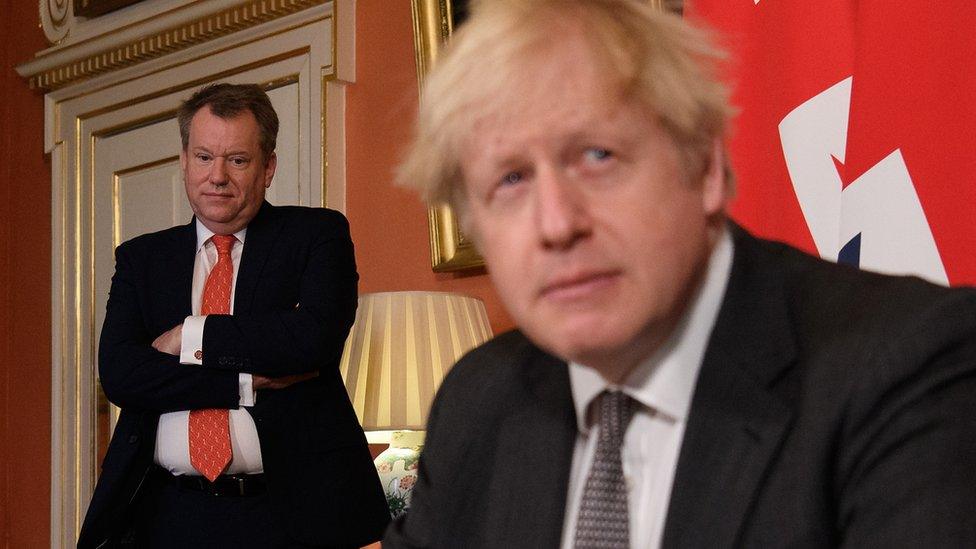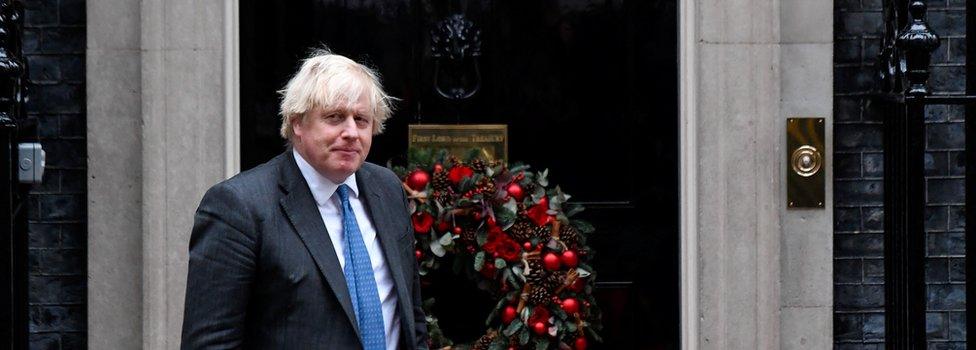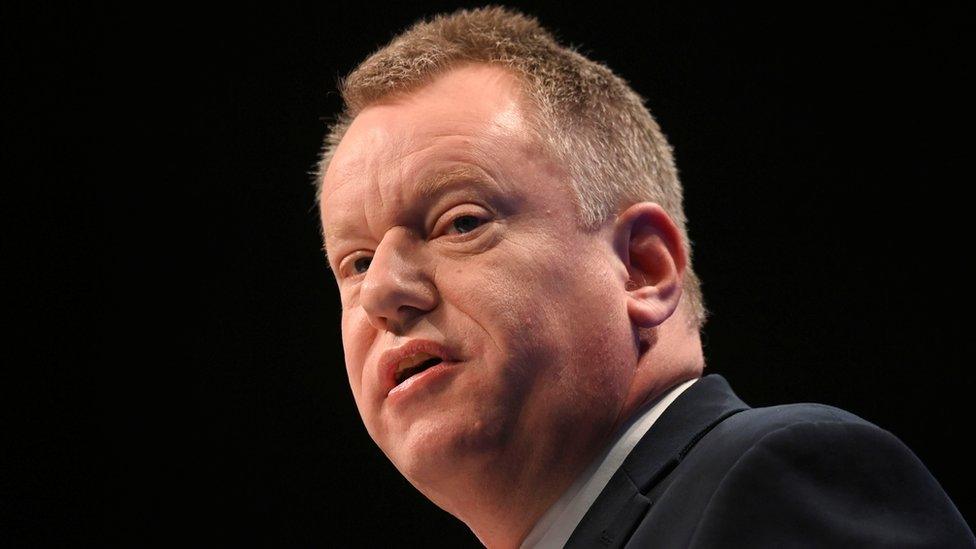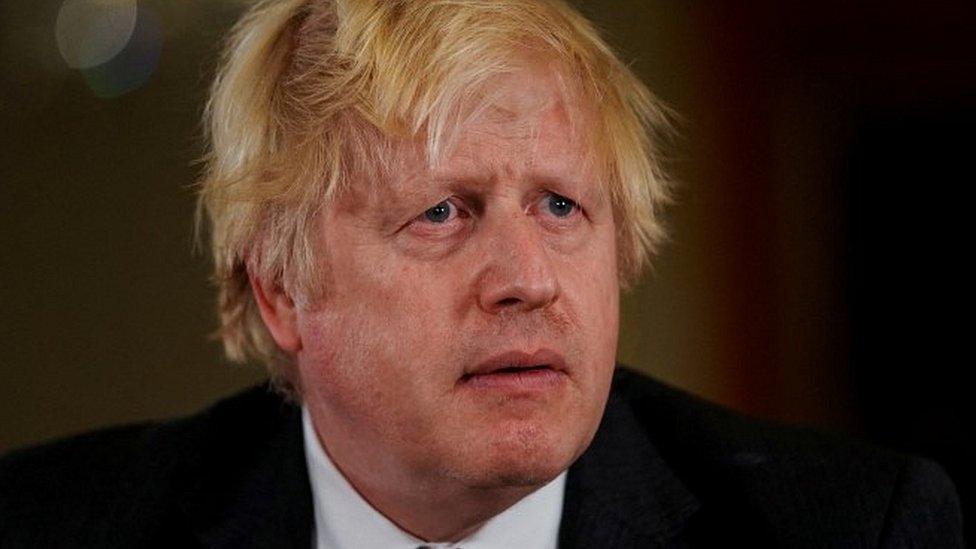Lord Frost resigns as Brexit minister
- Published

Brexit minister Lord Frost has resigned from the UK government over "concerns about the current direction of travel".
In a letter to Boris Johnson, the peer, who led Brexit negotiations, said he hoped the PM would "not be tempted" by "coercive measures" to tackle Covid.
Earlier this week, Mr Johnson faced the largest rebellion of his premiership from Tory MPs over measures to limit the spread of the new Omicron variant.
But the UK has seen days of record cases, with 90,418 on Saturday alone.
And more than 12,000 confirmed Omicron infections were reported on Sunday.
Scientific advisers have also warned England's hospital admissions could reach 3,000 a day without further restrictions.
Health Secretary Sajid Javid said Lord Frost was an "outstanding public servant", telling the BBC's Andrew Marr programme that while he disagreed with his remarks, the minister had "resigned out of principle... and we have to respect that".
But Labour's deputy leader, Angela Rayner, said the resignation suggested the government was "in total chaos right when the country faces an uncertain few weeks".
Ministers received a briefing on the latest Covid data on Saturday afternoon and a meeting of the Cobra emergency committee is expected to take place at 17:00 GMT.
And Mr Javid warned there were "no guarantees" on whether further restrictions would be brought in.
Lord Frost's resignation also comes after a major by-election defeat for the Conservatives, losing the formerly safe seat of North Shropshire to the Liberal Democrats.
The Mail on Sunday, which first reported the news, external, said he handed in his resignation a week ago, partly in disagreement with Covid curbs.
But in his letter to the prime minister, Lord Frost said now the arrangement to exit in January had been made public, he would leave with "immediate effect".
He wrote that Mr Johnson had been "an outstanding leader" during turbulence over Brexit, and the pair had a "close common understanding" on their aims in that area.
But after saying "Brexit is now secure", he added: "You know my concerns about the current direction of travel.
"I hope we will move as fast as possible to where we need to get to: a lightly regulated, low-tax, entrepreneurial economy, at the cutting edge of modern science and economic change."
'Coercive measures'
Lord Frost moved on to his concerns over the government's handling of the virus, saying the country needed to "learn to live with Covid".
"I know that is your instinct too," he wrote. "You took a brave decision in July, against considerable opposition, to open up the country again.
"Sadly it did not prove to be irreversible, as I wished, and believe you did too.
"I hope we can get back on track soon and not be tempted by the kind of coercive measures we have seen elsewhere."
In his reply, Mr Johnson did not address the critical elements of the letter, but said the now former minister should be "immensely proud of your historic service to this government and this country".
Mr Javid told Andrew Marr that Lord Frost was "entitled to his views," but added: "My own view in terms of the direction of travel, dealing with this pandemic, which is something no-one expected when we won the last general election, but also getting on with the priorities of the British people… this is all a huge part of what the government is getting on with."
He said he did not want "restrict people's freedoms" with Covid measures, but added: "The British people do understand this pandemic requires extraordinary actions and that's what last week was."
Asked if any further measures would be announced after reports of impending circuit breaker lockdowns ahead of Christmas, Mr Javid said: "There are no guarantees in this pandemic. At this point we have to keep everything under review."
But the health secretary said it "would be for parliament to decide" if any additional restrictions came into force.

What does Lord Frost's exit mean for the PM?
Analysis by Jennifer Scott, BBC political reporter

The past few weeks have been torrid for Boris Johnson.
From the fallout of the Owen Paterson scandal, to Christmas parties, Tory rebellions and by-election losses, there is no doubt his authority in No 10 has wavered.
So the resignation of close ally and Brexit backer Lord Frost cannot have been a welcome early Christmas present.
With Omicron cases on the up and fears of what could come next, there are rumours abound that the PM will have to bring in more measures to tackle the variant.
But the exit of Lord Frost has also given a certain section of rebellious backbenchers another chance to voice their frustrations with Johnson, and it seems unlikely they would support restrictions, having already rejected Plan B measures in the week.
With Health Secretary Sajid Javid saying there are "no guarantees" around what moves the government may have to make, Johnson could again be looking to Labour votes to secure any plan he comes up with.
But that will be yet another blow to an already-bruised prime minister and increase the volume of those angry MPs in his own party.

MPs have had mixed reactions to Lord Frost's exit from government.
But some of the 100 rebels who voted against the additional Covid measures that passed through the Commons earlier this week - including the use of Covid passports for some venues - said the resignation should act as a warning to Mr Johnson.
On Saturday night, Culture Secretary Nadine Dorries was kicked out of a WhatsApp group of Tory MPs - which counts many of the rebels as members - by former Brexit minister Steve Baker, after calling for "a bit of loyalty" towards the prime minister.
Afterwards, Mr Baker posted: "Enough is enough."
'A great loss' - Watch Tory MP Pete Bone describe how Conservative colleagues reacted to Lord Frost's resignation
Tory MP Andrew Bridgen said the PM was "running out of time and out of friends to deliver on the promises and discipline of a true Conservative government".
He added: "Lord Frost has made it clear, 100 Conservative backbenchers have made it clear, but most importantly so did the people of North Shropshire."
But their Tory colleague Simon Hoare, who chairs the Commons Northern Ireland select committee, said the peer was "unsuited to the 'doing of politics'" and "never understood the need for personal rapport or the importance of trust".
Northern Ireland Protocol
Lord Frost had most recently been engaged in negotiations with the EU over post-Brexit arrangements.
This included elements of the Northern Ireland Protocol, agreed by the UK and EU in 2019, that allows goods to cross the border between Northern Ireland and the Republic of Ireland without checks.
The protocol has been criticised by some businesses for making it more difficult to send goods to Northern Ireland from Great Britain.
DUP leader Sir Jeffrey Donaldson, who has been a long standing critic of the agreement, said the resignation raised questions about the UK's approach to the protocol.
He said Mr Johnson "must now urgently decide which is more important - the protocol or the stability of the political institutions".
Northern Ireland's deputy first minister, Sinn Fein's Michelle O'Neill, said momentum was needed in negotiations to make the protocol work better.
"The North will not be collateral damage in the Tory chaos," she added.

The view from Brussels

It's easy for analysts or journalists to dial-an-EU diplomat following David Frost's resignation as Brexit minister and hear them say something "not very complimentary" (if we're being polite).
Lord Frost's "hardball" manner was not appreciated in Brussels, but it was recognised as a negotiating tactic.
However, it would be a mistake to believe his departure will have a massive impact on post-Brexit relations.
Mistrust in the UK government will likely remain, long after Lord Frost leaves.
Why? Because key EU leaders, like Germany's Angela Merkel (and her successor Olaf Scholz), France's Emmanuel Macron and the Netherlands' Mark Rutte, say they believe successive UK prime ministers - namely David Cameron, Theresa May and Boris Johnson - were dishonest with them.
The oft-heard Brussels view is that UK governments tried to "play the EU like fools" as of setting the Brexit referendum date, with prime ministers speaking to the EU about Brexit in a more collegiate manner, then becoming far more hard-line when addressing the UK domestic audience - in particular, their own Conservative Party.
As of now depending on the decisions by Boris Johnson, and the PM that eventually follows him (whenever that may be), rather than Lord Frost's departure, whether cross-Channel relations can improve or deteriorate.
This is not about reversing Brexit, or changing a hard Brexit to a soft one. It's more a question of whether or not the two sides can work better together on the Northern Ireland Protocol, wider post-Brexit trade issues, security and defence, and financial services.
Brussels is pessimistic, at least in the short-term. But future EU-UK relations are about a lot more than Lord Frost.


CHRISTMAS IN THE MIDDLE AGES: What were the festivities like for our ancestors?
HOW DO YOU REACT TO A BAD PRESENT? Hayley Pearce on the worst Christmas gifts she has received

Related topics
- Published18 December 2021

- Published17 December 2021

- Published27 February 2023

- Published17 December 2021

- Published17 December 2021